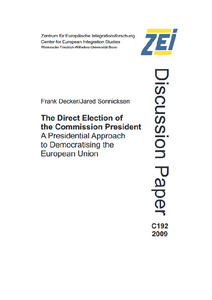The direct election of the Commission presidentA presidential approach to democratising the European Union

The direct election of the Commission president
A presidential approach to democratising the European Union

| dc.contributor.author | Decker, Frank | |
| dc.contributor.author | Sonnicksen, Jared | |
| dc.date.accessioned | 2022-06-23T14:59:49Z | |
| dc.date.available | 2022-06-23T14:59:49Z | |
| dc.date.issued | 2009 | |
| dc.identifier.uri | https://hdl.handle.net/20.500.11811/9924 | |
| dc.description.abstract | It has become common knowledge by now that the European Union does not have it particularly easy when it comes to democracy. A commensurately difficult task for political science is to analyse the EU in conventional democratic-theoretical categories or to produce generally valid conclusions on the condition and necessity of democracy at the European level. This situation stems from four interlinking factors: (1) the functional and structural ambivalence of this sui generis political body, (2) the subsequent uncertainty with regard to the criteria to be used for evaluating the democratic quality of European governance, (3) the resultant differences in opinion as to which model is the most appropriate for democratising the EU, and (4) the continuing dissent on whether the EU – because of its peculiar nature – can or should be democratised at all. It is precisely this unprecedented character in turn that renders the analysis and assessment of democratic legitimacy in the European Union a difficult, if not hopeless endeavour.
On the one hand, the EU represents substantially more than a conventional international organisation given the scope of the competences and areas of responsibility transferred to it; on the other hand, it encompasses only a fraction of those features that normally characterise a democraticconstitutional state. Nonetheless, it would seem evident that politics take place in the European Communities, that the European Union can be considered a political system and thus a suitable case for study in comparative political science. Despite this unique political system’s frequent classification as sui generis, there is good reason to defy the taboo against subjecting it to comparative analysis. Granted, the EU may be a “one-of-a-kind kind of polity”, but then again, all political systems – not unlike people – are in sum unique. Furthermore, even if the EU is not itself a state, it can still be compared with other political systems constituted as states, if for no other reason than the common or unique (sui generis as it were) aspects of the EU’s institutional structure and functioning can only be captured by comparing it with other polities. Assuming that, we attempt in the following analysis to provide answers to two fundamental questions: we will examine which model of government most closely coincides with the European Union. Building upon that assessment of the development path taken by the institutions of the Community, we explore the opportunities and feasibility of realising such model as a step toward more democracy in European governance. | en |
| dc.format.extent | 39 | |
| dc.language.iso | eng | |
| dc.relation.ispartofseries | ZEI Discussion Paper ; C192 | |
| dc.rights | In Copyright | |
| dc.rights.uri | http://rightsstatements.org/vocab/InC/1.0/ | |
| dc.subject | Europäische Union | |
| dc.subject | Europäische Kommission | |
| dc.subject | Europäische Kommission / Präsident | |
| dc.subject | Direktwahl | |
| dc.subject.ddc | 320 Politik | |
| dc.title | The direct election of the Commission president | |
| dc.title.alternative | A presidential approach to democratising the European Union | |
| dc.type | Arbeitspapier | |
| dc.publisher.name | Zentrum für Europäische Integrationsforschung (ZEI) | |
| dc.publisher.location | Bonn | |
| dc.rights.accessRights | openAccess | |
| dc.relation.pissn | 1435-3288 | |
| dc.relation.pisbn | 978-3-936183-92-4 | |
| dc.relation.url | https://www.zei.uni-bonn.de/de/publikationen/medien/zei-dp/zei-dp-192-2009.pdf | |
| ulbbn.pubtype | Zweitveröffentlichung | |
| dc.version | publishedVersion |
Dateien zu dieser Ressource
Das Dokument erscheint in:
-
ZEI Discussion Paper (286)




